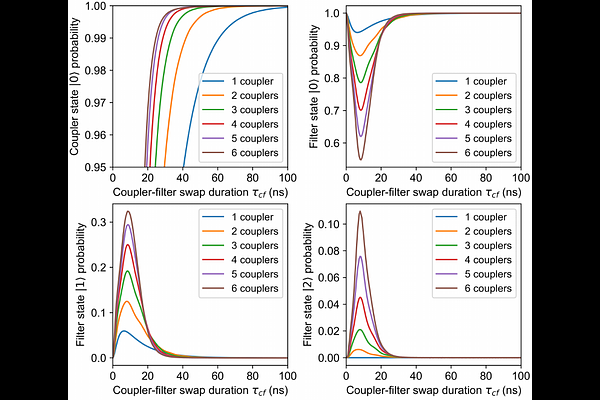Flexible Readout and Unconditional Reset for Superconducting Multi-Qubit Processors with Tunable Purcell Filters

Flexible Readout and Unconditional Reset for Superconducting Multi-Qubit Processors with Tunable Purcell Filters
Yong-Xi Xiao, Da'er Feng, Xu-Yang Gu, Gui-Han Liang, Ming-Chuan Wang, Zheng-Yu Peng, Bing-Jie Chen, Yu Yan, Zheng-Yang Mei, Si-Lu Zhao, Yi-Zhou Bu, Cheng-Lin Deng, Xiaohui Song, Dongning Zheng, Yu-Xiang Zhang, Yun-Hao Shi, Zhongcheng Xiang, Kai Xu, Heng Fan
AbstractQubit readout and reset are critical components for the practical realization of quantum computing systems, as outlined by the DiVincenzo criteria. Here, we present a scalable architecture employing frequency-tunable nonlinear Purcell filters designed specifically for superconducting qubits. This architecture enables flexible readout and unconditional reset functionalities. Our readout protocol dynamically adjusts the effective linewidth of the readout resonator through a tunable filter, optimizing the signal-to-noise ratio during measurement while suppressing photon noise during idle periods. Achieving a readout fidelity of $99.3\%$ without using Josephson parametric amplifiers or traveling-wave parametric amplifiers, even with a small dispersive shift, demonstrates its effectiveness. For reset operations, our protocol utilizes the tunable coupler adjacent to the target qubit as an intermediary to channel qubit excitations into the Purcell filter, enabling rapid dissipation. We demonstrate unconditional reset of both leakage-induced $|2\rangle$ and $|1\rangle$ states within 200 ns (error rate $\leq1\%$), and reset of the $|1\rangle$ state alone in just 75 ns. Repeated reset cycles ($\leq600$ ns) further reduce the error rate below $0.1\%$. Furthermore, the filter suppresses both photon noise and the Purcell effect, thereby reducing qubit decoherence. This scalable Purcell filter architecture shows exceptional performance in qubit readout, reset, and protection, marking it as a promising hardware component for advancing fault-tolerant quantum computing systems.